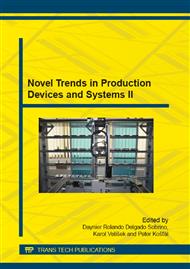p.117
p.123
p.129
p.135
p.141
p.147
p.153
p.159
p.165
Improving the Sustainability and Effectiveness of the Inventory Management in Manufacturing Company
Abstract:
The aim of the project was to optimize the company's inventory management and to suggest measures to minimize inventory and costs and maximize production in an effective and sustainable way. The effectiveness and sustainability of the logistics processes was focused on streamlining of inventory management through the actualization and improvement of existing system Kanban. In the context of sustainable development we propose the Kanban method because its principles are to eliminate waste and to ensure employees satisfied. In the centre of attention is the employee and the company should care for its satisfaction by means of enhancement of workplaces. The objective of this paper is to present characteristics of the Kanban method in theory and practice; it addresses actualization and improvement of the Kanban system and recommendations for future sustainable Kanban system. The work is a part of KEGA project No. 037STU-4/2012 - Implementation of the subject “Sustainable Corporate Social Entrepreneurship” into the study program Industrial management in the second degree at the MTF STU Trnava. and submitted project VEGA No. č.1/0510/15 Sustainable strategic management vs. sustainable corporate social responsibility vs. integrated management system of strategic business units.
Info:
Periodical:
Pages:
141-146
DOI:
Citation:
Online since:
December 2014
Authors:
Keywords:
Price:
Сopyright:
© 2014 Trans Tech Publications Ltd. All Rights Reserved
Share:
Citation:


